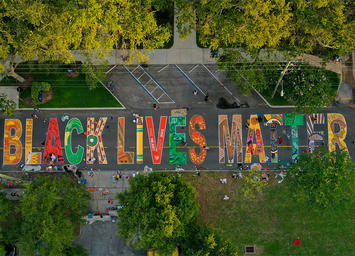
It’s an article of faith among many conservatives, and some liberals, that we’re being swept by a Maoist cultural revolution destined to transform American society into a woke collective. Yet before surrendering basics like equality of opportunity, social order, and free speech to leftist authoritarians, we should consider whether they’re the ones who will wind up getting canceled.
Most Americans don’t favor defunding police or instituting race quotas; they are wary of the costs connected with the Green New Deal and of allowing Washington to control local zoning. Many are already voting with their feet, fleeing places that promote these ideas and seeking out areas aligned with more recognizable American values. Over the past 20 years, virtually all the most progressive large states—New York, New Jersey, Illinois, and California—have suffered massive outmigration, while red or purplish states like Florida, Texas, the Carolinas, or Arizona welcome more and more Americans to resettle there. On the metropolitan level, even before Covid-19 accelerated the trend, a steady, largely unacknowledged, movement from the deep-blue core to the less progressive suburbs or exurbs has been underway.
Political correctness—the secular religion of elite liberal society—turns out to be enormously unpopular, something President Trump has exploited politically. Some 80 percent of Americans, notes one recent survey, including most millennials and minorities, see political correctness as “a problem,” not a solution for the future. Progressive social activists, a survey by the liberal research organization More in Common found, account for barely 8 percent of the adult population, less than a third of the number who identify as traditional conservatives.
The fact that most Americans—Democrat and Republican—fall between these two categories suggests that social attitudes may be far less polarized, and less susceptible to political correctness, than has been widely assumed. As seen in the reaction to the George Floyd case, most Americans generally back the police but also embrace the notion of police reform; they are increasingly hostile, however, to the wave of violence that has accompanied some of the protests. Rather than support growing attempts to limit free speech, almost four in five Americans, according to Pew, support protecting it. These attitudes extend well beyond the base of Trumpian conservatives to include most Americans, regardless of ethnic background.
The media epitomize the gap between the public and the nation’s dominant institutions. Subjectivity, notes a recent Rand study, has replaced the world of shared facts with approaches that lead to “truth decay.” Reporters once believed that their mission was to inform the public, but now many journalism schools, including Columbia, embrace progressive groupthink, openly advancing a leftist social-justice agenda in which reporters are advocates. Even Teen Vogue has taken a neo-Marxist tack. “Moral clarity” replaces objectivity. Free speech is somehow linked to white privilege.
These partisan attitudes have dramatically eroded trust in media, according to a new Knight Foundation study. Public trust in most large media has declined steadily over the past four years, with the biggest drops among Republicans; the New York Times, the publisher of the 1619 Project takedown of American history, is trusted by less than half of the public, compared with almost 60 percent in 2016. Gallup reports that, since the pandemic, the news media has suffered the lowest ratings of any major institution, performing even worse than Congress or President Trump.
Certainly, the shift leftward has not helped the progressive-dominated newspaper business. Between 2001 and 2017, the publishing industry (books, newspapers, magazines) lost 290,000 jobs, a decline of 40 percent. Endless partisan sniping and countless crises have boosted CNN, but the network lags well behind right-wing Fox. NPR has seen its ratings drop as many listeners gravitate to less predictable, livelier voices like Joe Rogan.
The new media also suffer from a credibility crisis. Controllers like those at Facebook, Google, Apple, and Twitter are increasingly determined to curate “quality content” on their sites, or even eliminate views they find objectionable, which tend to be conservative, according to employees. The idea that managers of huge social-media platforms aim to control content is more than conservative paranoia. Over 70 percent of Americans, according to a recent Pew study, believe that such platforms—as demonstrated in the case of Reddit, Facebook, and Google—“censor political views.” In California, the center of Big Tech, people express more trust in the marijuana industry than they do in social media, according to a 2019 survey.
Read the rest of this piece at City Journal.
Joel Kotkin is the author of The Coming of Neo-Feudalism: A Warning to the Global Middle Class. He is the Presidential Fellow in Urban Futures at Chapman University and Executive Director for Urban Reform Institute. Learn more at joelkotkin.com and follow him on Twitter @joelkotkin.
Photo credit: City of St Pete via Flickr under CC 2.0 License.












